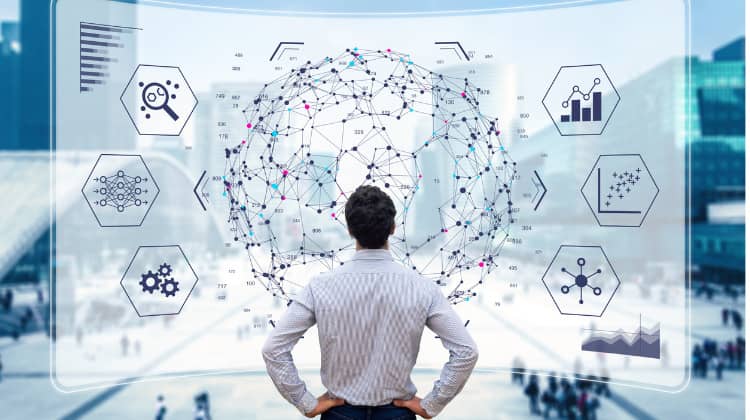During the coronavirus outbreak in Amsterdam, city leaders took steps to help citizens at risk of isolation due to lockdown measures. As part of the city's "Everyone Connected" project, an ecosystem comprised of local technologists and civil society groups cooperated to deliver refurbished laptops with Internet connectivity to low-income, elderly and other citizens with below-average digital access. This is an example of a local ecosystem responding to an urgent situation that threatened to exacerbate digital and social exclusion. Smart city ecosystems are vital in implementing sustainable solutions and responding to a crisis.
A smart city ecosystem is a system of partnerships that deliver technical skills, knowledge sharing, innovation capacity, and digital strengths. In responding to the pandemic situation, the Amsterdam ecosystem partners included:
- Municipal government - to approve the project budget
- Companies - supplying used laptops
- SiSo B.V. - refurbishing the laptops
- Deudekom - delivering last-mile logistics
- T-Mobile - supplying internet connectivity
- Civil society groups - distributing more than 3,000 refurbished laptops
- Digi Surfer B.V. - providing training and help desks
Joost Kaan Wagenaar, Digital Skills Coordinator at Digi Surfer B.V., says "support and education is an ongoing process. Many recipients of the refurbished laptops have low digital skills and cannot simply pick up a laptop and go to work. They need guidance, and that is something we and our colleagues in civil society organizations and social enterprises are committed to."
According to Smart Cities World, "smart cities epitomize the concept of an ecosystem. Smart city initiatives aim to drive digital innovation to improve the lives of citizens and make urban living sustainable." The MIT Sloan Management Review says "ecosystems are attractive because of the new possibilities they create for products and services spanning traditional boundaries."
Smart cities and ecosystems must regain momentum
In 2019, a far-sighted report from the Global Preparedness Monitoring Board warned about the lack of preparation for a global pandemic. “And yet here we are today,” said Mahmoud Mohieldin in 2020. Mohieldin - UN special envoy on financing the 2030 Agenda for sustainable development goals (SDGs) - believes that “when we look at these goals, we shouldn’t look at them as nice to have or as an agenda for 2030. This is an agenda to guide our work and practices now.”
Within a few months after pandemic lockdowns in 2020, global momentum in meeting the SDGs was curtailed when resources were diverted to the coronavirus emergency. "The severity of the global crisis means that sustainability officers are wrestling with the increasingly clear picture that projects they have been working so hard to advance may be delayed, reduced in scope, or even canceled completely," according to ICLEI.
“Everything we do during and after this crisis must be with a strong focus on building more equal, inclusive and sustainable economies and societies that are more resilient in the face of pandemics, climate change, and many other global challenges,” said António Guterres, UN Secretary-General, at a G20 summit.
Cities striving to meet the SDGs face a colossal task. A task requiring moonshots of data-driven innovation and the commitment of partners and ecosystems.
Cooperation beyond local boundaries
Cities and their ecosystems benefit from cooperating with other cities. In a global survey of more than 200 urban ecosystems and city networks, university researchers discovered that cities are cooperating across borders at an increasing rate and "now form a wide ecosystem of global partnerships between local authorities that is often underestimated."
Organizations with international approaches to urban innovation, sustainability, and collaboration enable smart city ecosystems to reach beyond their local confines. These boundary-spanning entities - such as bee smart city, United for Smart Sustainable Cities (U4SSC), and Local Governments for Sustainability (ICLEI) - feature international memberships and share knowledge and solutions with government leaders and urban innovators.
- bee smart city, a trusted smart city network, empowers smart sustainable cities by facilitating the global exchange of best practice solutions and lessons learned. With more than 13,000 members from 170 countries and more than 700 solutions implemented in over 1,000 cities, bee smart city connects local government leaders, urban innovators, solution providers, and other stakeholders.
- With the backing of the UN, the U4SSC facilitates smart city innovation and provides key performance indicators (KPIs) to evaluate progress toward the SDGs. The KPI evaluations help businesses to identify opportunities for sustainable value creation and inform local governments on how to improve urban sustainability. The U4SSC is committed to “advancing best practices in the use and processing of city data” and supporting the development and testing of digital twin cities.
Data-driven sustainability
Prior to the global pandemic, the UN reported that global sustainability challenges require urgent collective attention. "It is abundantly clear that a much deeper, faster and more ambitious response is needed to unleash social and economic transformation."
Unleashing transformation in cities depends on collecting and sharing data that reveals insight on local problems and potential solutions. In a paper addressing the ecosystem of urban data, university researchers state that "data is very much at the heart of urban issues, if not a paradigm shift in how we conceive of urban governance."
A UN summit recognized that sustainable development requires "the collection, processing, analysis and dissemination of an unprecedented amount of data and statistics at local, national, regional and global levels and by multiple stakeholders.” However, local government shortcomings in data collection, analytics and data-sharing represent barriers to innovation and ecosystems. A Smart Cities Dive article reveals weaknesses in local government strategies - based on a survey from management consultancy Oliver Wyman. The survey results from more than 100 cities indicate that "cities are far from where they should be to handle a data-driven future" and "no city is close to being ready for the challenges ahead."

Many initiatives and innovators are working to overcome the barriers to a data-driven future. Open & Agile Smart Cities (OASC) is a network dedicated to connecting cities worldwide “to learn from each other and exchange digital, data-driven solutions based on Minimal Interoperability Mechanisms (MIMs).” The MIMs provide “a set of practical capabilities based on open technical specifications” which serve as a foundation for procurement and deployment of urban data platforms.
Innovative firms offering urban data services and solutions include:
- UrbanLogiq - providing a data analytics platform with a unified view of urban behavior to help cities consolidate data residing in silos
- [ui!] The Urban Institute - supplying an open urban data platform to connect all the different systems of a smart city and to create, reuse and re-purpose urban data.
- Opendatasoft - delivering a data-sharing solution that enables local governments to organize, share and visualize urban data
Confronting hard questions
Speaking at a Smart City Expo event, Sandra Baer, President, Personal Cities, said "we need to ask hard questions, and we need to keep asking those questions in order to have a higher quality of life in our communities." Baer believes in re-imagining global urbanization and giving space and time to ask questions. "By asking the hard questions - the questions that expose our biases, the questions that bring our beliefs to the surface - only then will we hear and formulate the right questions that unlock solutions no one else has discovered,” she said.
Are civic leaders asking hard questions about sustainability and ecosystems? For example, how can cities move faster to achieve the SDGs? How can cities better prepare ecosystems to respond to future crises? Can cities and ecosystems achieve the SDGs through incremental innovation - or must they create breakthrough solutions?
Prior to the pandemic, analysts from the Boston Consulting Group (BCG) stressed that "we are moving too slowly to keep pace with growing societal needs and are in danger of coming up woefully short of those targets." BCG questions if governments involved in social and sustainable development "have identified the specific areas within the institution’s mandate that most need breakthrough innovation."
Nessa Whelan, Head, UN Global Compact LEAD, says "the SDGs are universal, interconnected and exponential in nature" and "exponential goals require transformational solutions that go beyond incremental innovation." She thinks it is time to raise sustainability ambitions and "adopt new mindsets, build and trial new business models, and develop and deploy disruptive technologies. These actions are how we define breakthrough innovation.” Time will tell which cities, in the aftermath of the pandemic, have the vision and ecosystems to accomplish more than incremental changes.
Enable the power of smart ecosystems
A crisis, although painful, is a learning experience. As governments struggle to recover from the coronavirus and its tragic impact, smart cities share lessons learned. "One of the key lessons learned from this pandemic is that no city is big enough to face this pandemic alone, and that collaboration between different levels of governments is key," writes Pilar Conesa, CEO of anteverti and curator of the Smart City Expo World Congress. Conesa and her co-authors believe the pandemic "has once again put on the table the importance of working from the local level on alliances with research centers, non-profits, startups, corporations and the entire knowledge and innovation ecosystem."
A smart city consists of a mixture of ecosystems, partnerships and initiatives. The challenge is to enable a sustainable mixture which can learn, adapt and respond to urban challenges and crises.
While international initiatives are important (and capture the headlines), civic leaders should not overlook the power of local ecosystems. Amsterdam's "Everyone Connected" project demonstrates that ecosystems piloted by local innovators create smart solutions not only in normal times but also in perilous times.
In the world's largest smart city network and community you can explore hundreds of smart city solutions to develop intelligent ecosystems. Join now for free to share smart ecosystem solutions and lessons learned with thousands of members and potential collaboration partners on bee smart city.
Read related articles:
- Amsterdam Smart City: A World Leader in Smart City Development
- Smart City Vienna: A Collaborative Smart City
- Bologna: The Evolution of a Collaborative Smart City
- How Universities Add Value in Smart City Innovation
- Explore more Smart City Strategy articles
Image Source:
iStock, ID: 1205428317, Credit: NicoElNino


